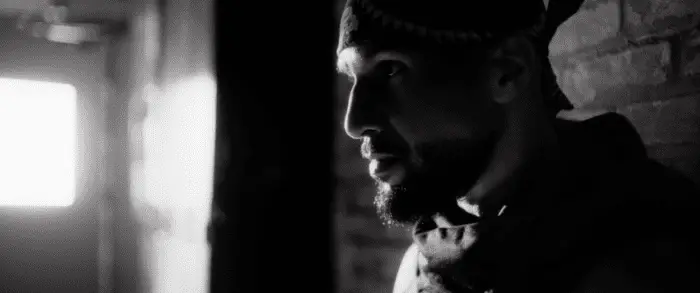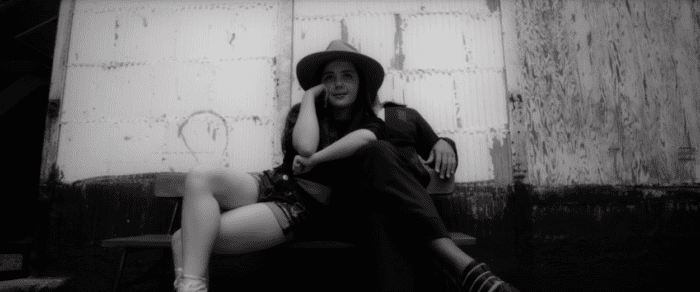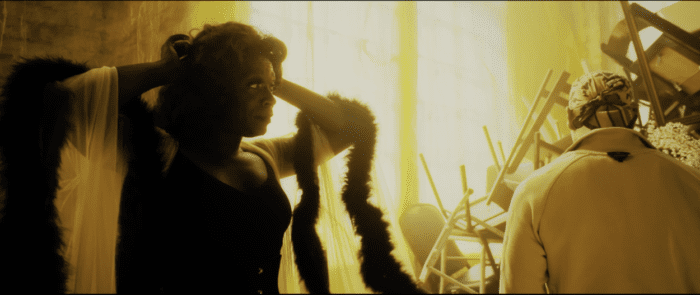I’m Not Gay: A Musical (2023, dir. Scott L. Semer) dares to interrogate the intersections of sexuality, masculinity, and trauma at a time when few seem to want that kind of messy conversation. With queer people and issues in the nation’s spotlight recently, it’s very easy to approach a film like this with one’s guard up. People tend to like simple, clean stories for their representation—films that ask and answer questions in their entirety with enough time to grab dinner after. With I’m Not Gay, these questions have all of the complexities of grappling with real identities and very real consequences.

Misha (Sydney James Harcourt) is facing an uphill battle. When audiences first meet him, Misha is very nearly splitting himself in two over his struggles, his family vs his identity, fighting vs dancing, he’s caught between the life he has and the one he’s avoiding at all costs. This theme of the two selves Misha is attempting to juggle is near-constant, his expressions of sexuality and masculinity are doubled, mirror images of separate selves contained within the same person.
The central plot of I’m Not Gay presents an almost comic scenario: in order to purchase a house, Misha must convince the current owner that he is gay. Questions over his own sexuality trigger Misha, who attempts to keep himself utterly embroiled in classical masculinity. The film feels aware of this, however, even portraying a birdcage as a reference both to films past and Misha’s questions and struggles over his identity.

In spite, or perhaps because, of its premise, I’m Not Gay uses this plot to its fullest in order to examine Misha. While many movies with a queer premise opt to challenge the characters to accept each other, here the characters are challenged to accept themselves. Similarly, it feels as if writer and director Scott L. Semer is challenging the audience to accept Misha. It’s rare that the messy aspects of being queer, or even questioning, are displayed so openly—even more so when the actor portraying them isn’t white. If audiences can accept Semer’s depictions here, perhaps the door could be opened ever so slightly to allow for more stories to be told.
Semer’s use of violence manages to be understated, with scenes that would otherwise appear gratuitous instead being replaced by dance. Careful choreography is used which still shows the same conflict but refuses to allow Misha to be seen as someone inherently violent. Even in times when other traditionally masculine fathers would be, such as seeing his daughter with a boy who seems to push her boundaries, Misha remains calm. If nothing else, the film is keenly aware of how many people still view people of color and does its best not to play into those same stereotypes.
At first glance, it may appear that there are some old elephants in the room, hiding under tired dusty sheets. Many members of the queer cast initially come across as old stereotypes, largely being cisgender effeminate white gay men with a love for dancing. Even as some level of complexity is given to them, notably to Rush (Brad Bradley), it’s not expanded upon, merely mentioned. In the case of Dr. Maxine “Maxi” Caspar (Alan Mingo Jr.), a character referred to as transgender is played by an actor known for drag, not by a transgender actress. However, as writer and director Scott L. Semer explained, much of this was intentional.

“We wanted to play with people’s expectations a bit, like seeing Fire Island. Even Maxi plays with that as part of Misha’s treatment, playing with those stereotypes and how he still sees things a certain way,” Semer said. While there are certainly no rules against his portrayal, and Mingo is still great in his role, it felt like a wasted opportunity to not utilize a transgender actress—especially at a time when many still conflate drag performers and transgender people, with that being used to target the latter.
Semer describes the care Mingo and the production staff put into this portrayal. Everything from the writing and costuming down to the intricacies of the performance was diligently crafted. For a film that seems intent on examining so much, it feels strange for there not to be a wider range of queer characters and actors within it. For a community vibrant enough to bring color into the film, having only an unsaturated glimpse at it is nearly disappointing.
There’s a particularly strong use of color in the film, with bright spring pastels combating the hard, wintery cold black and white of the life Misha has been living. It feels like a new world drawing him in, asking him to bask in the warmth that he never allows himself to feel. Simultaneously, Harcourt brings a particularly warm parental presence to his role whenever the script allows him to. Cooking, teaching his daughter Brooklyn (Gracie Bryant) to pirouette, and even sharing a song about queer stereotypes and culture with her are all highlights of the film.

Throughout so much of I’m Not Gay, there’s a compounding sense of loneliness. Every setback places Misha back on his own, stuck in a set that manages to feel superreal, places that could exist, but feel so lived in and well-loved that they surely must. The contrast between the places that perpetuate harm against him and the ones that accept Misha is plain to see. Harsh light gives way to soft, blooming illumination as the world is carried from scene to scene.
While I’m Not Gay asks many questions, one of the things it refuses to do is give direct answers. With so much talk of queerness in the film, there is never an outright declaration of Misha’s sexuality. While this may seem dissatisfying, it’s among the most real aspects of the film—even the ending number simply refers to it as “other.”

Questioning sexuality is an ongoing process, something a person is never really finished with. The conflict here isn’t around any outright declaration from Misha, rather it’s just opening the door for him to be comfortable with the journey of figuring things out, free of his traumas and abuse forcing him to hide from anything that would make anyone question it.
Those very aforementioned traumas, while they will remain unnamed here, come from an unfortunate real-life aspect of the shared experience of many queer people. Like so many other aspects of the film, there’s a reflection of queer reality, the beauty, the ugliness, the banality. While I’m Not Gay: A Musical asks many questions, the only answer it ever gives is the only one that seems to matter: embracing joy is enough.
I’m Not Gay: A Musical streams on VOD platforms beginning April 11, 2023.




